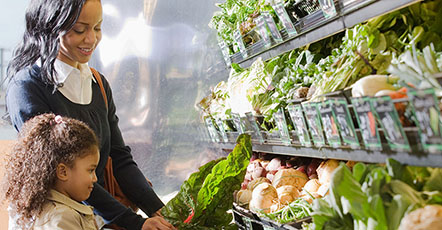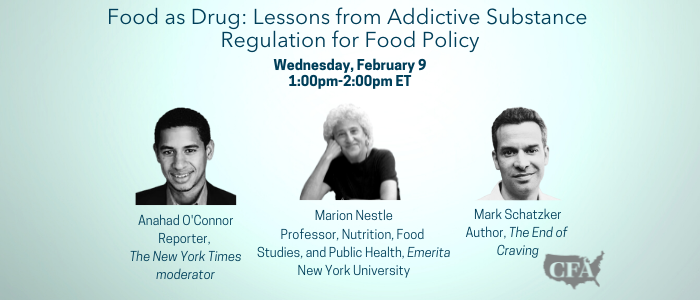Virtual National Food Policy Conference Series
Due to national efforts to contain the COVID-19 virus, CFA’s National Food Policy Conference gatherings moved online. Because programming for our online events is necessarily abbreviated, we have added a series of speaker and panel discussions throughout the 2020, under the title Virtual National Food Policy Conference Series.


Nudges to Better Nutrition
In recent years, an increasing number of healthcare providers have embraced the food-as-medicine movement, incorporating food into treatment regimens for diseases like diabetes and hypertension. But if some foods serve as potent therapeutic drugs, others are susceptible to abuse. Ultraprocessed foods, in particular, have attracted increasing attention for their contribution to diet-related disease, which costs the U.S. billions of dollars per year in medical costs alone. This panel will explore the extent to which ultraprocessed foods resemble products like tobacco, alcohol or cannabis, that are conventionally understood to be addictive and receive special regulatory treatment as a result. To what extent can foods be addictive? How and why do food companies target Black and Hispanic consumers with marketing for ultraprocessed foods? How do policies on ultraprocessed foods relate to advancing nutrition security, and to building a more equitable and just food system? To what extent should policies governing addictive substances apply to foods? A panel of experts will discuss.

Food as Drug: Lessons from Addictive Substance Regulation for Food Policy
Cell-cultured meat, cell-based meat, cultivated meat, cellular agriculture, lab-grown meat, clean meat—call it what you will, meat without animals appears poised to hit supermarket shelves in the not so distant future. Regulators in Singapore approved the world’s first cell-cultured chicken for human consumption in December of 2020, and hundreds of millions of investment dollars continue to pour into companies dedicated to producing animal products without the animal. But federal food safety authorities have yet to establish a regulatory process for evaluating these novel products, and the path is fraught with uncertainty surrounding how cell-cultured meat products should be labeled and evaluated for safety, and what companies need to disclose about their production processes. This panel explored public policy around cell-cultured meat and its significance.
Meat Without Animals: Exploring Public Policy Around Food Made with Cultured Animal Cells
Cell-cultured meat, cell-based meat, cultivated meat, cellular agriculture, lab-grown meat, clean meat—call it what you will, meat without animals appears poised to hit supermarket shelves in the not so distant future. Regulators in Singapore approved the world’s first cell-cultured chicken for human consumption in December of 2020, and hundreds of millions of investment dollars continue to pour into companies dedicated to producing animal products without the animal. But federal food safety authorities have yet to establish a regulatory process for evaluating these novel products, and the path is fraught with uncertainty surrounding how cell-cultured meat products should be labeled and evaluated for safety, and what companies need to disclose about their production processes. This panel explored public policy around cell-cultured meat and its significance.
Moderator
Tom Philpott, Mother Jones
Panelists
Jessica Almy, The Good Food Institute
Isha Datar, New Harvest
Tom Neltner, Environmental Defense Fund
Jim Thomas, ETC Group

Policies for a Post-Pandemic Hangover: Addressing Alcohol Use in the Time of COVID-19 and Beyond
Researchers have documented a sharp increase in harmful alcohol use during the COVID-19 pandemic, which threatens to compromise public health long after the last lockdowns and stay-at-home orders are lifted. In addition to social isolation and economic stress, public policies—including relaxed restrictions on home delivery and health claims for alcohol, and deep tax cuts for the alcohol industry—have helped to drive higher alcohol consumption. Why are consumers drinking more, and why does it matter? What public policies are available to nudge consumers towards healthier, and better informed choices? Why aren’t ingredients, calories, and other nutrition facts included on alcoholic beverage labels? A panel of experts will discuss these and other questions.
Moderator
Melissa Maitin-Shepard
Founder and Principal, MMS Health Strategies, LLC
Panelists
Dr. Raimee H. Eck – View Presentation
Past President, Advocacy Co-Chair, Maryland Public Health Association
Thomas M. Gremillion – View Presentation
Director of Food Policy, Consumer Federation of America
Dr. Timothy Naimi – View Presentation
Director, Canadian Institute for Substance Use Research
Cassandra Tourre – View Presentation
Director of Public Policy, National Alcohol Beverage Control Association
A New Day at USDA for Food Safety?
Progress on reducing foodborne illness from pathogens like Salmonella and Campylobacter has been stalled for the last 20 years. Much of this illness is caused by contaminated meat and poultry. What is the U.S. Department of Agriculture, the agency responsible for regulating meat and poultry safety, doing to reduce foodborne illness? Does USDA need a new statutory mandate, similar to the Food Safety Modernization Act, which gave the U.S. Food and Drug Administration mandatory recall authority and other expanded powers a decade ago? What are the leading proposals for reform? In particular, does USDA need to rethink its approach to Salmonella and Campylobacter? A panel of experts will discuss the future of food safety regulations at USDA.
Moderator
Margarita Raycheva, IHS Markit
Panelists
Mike Robach, The Robach Group
Patricia Griffin, M.D., Centers for Disease Control and Prevention – View Presentation
Sarah Sorcher, Center for Science in the Public Interest – View Presentation
Food System Reform in the Biden/Harris Era: Panel Discussion
Food policy advocates have a long list of reforms for the Biden-Harris administration and the 117th U.S. Congress, from recruiting farmers to mitigate climate change, to slowing down line speeds at meatpacking plants. What policies are most likely to change, and which ones will stir up the most controversy? How will Democrats’ control of the Senate affect the odds of reform? In this Virtual National Food Policy Conference series event, a panel of experts will discuss these and other questions, and offer their vision of a post-COVID-19 food system.
2:00 PM
Moderator
Laura Reiley Washington Post
Panelists
Scott Faber, Environmental Working Group
Sean McBride, DSM Communications
Beth Johnson, Food Directions LLC
Brian Ronholm, Consumer Reports.
Food System Reform in the Biden/Harris Era: Keynote Address
Food policy advocates have a long list of reforms for the Biden-Harris administration and the 117th U.S. Congress, from recruiting farmers to mitigate climate change, to slowing down line speeds at meatpacking plants. What policies are most likely to change, and which ones will stir up the most controversy? How will Democrats’ control of the Senate affect the odds of reform? In this Virtual National Food Policy Conference series event, a panel of experts will discuss these and other questions, and offer their vision of a post-COVID-19 food system.
3:30 PM
U.S. Senator Bob Casey